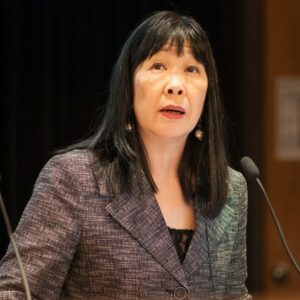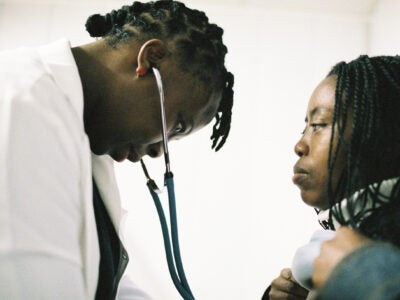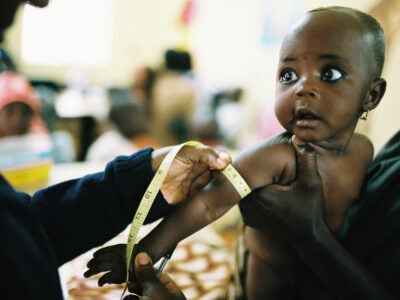 Phyllis Kanki’s research is focused on the virology, pathogenesis and molecular epidemiology of HIV and other viral infections in Africa. In the mid-1980s, as a doctoral student with Max Essex at SPH, she was part of the team to discover the Simian Immunodeficiency Virus (SIV) in captive immunodeficient macaque monkeys and characterize its relationship to HIV. Her further research described African Cercopithecine primates as the natural host of SIV which led to the first evidence of an SIV-related virus in humans in Senegal, West Africa. HIV-2 is the closest human immunodeficiency virus related to HIV-1 and based on long term research collaborations with Professor Souleymane Mboup at Université Cheikh Anta Diop in Senegal, her work provided the initial characterization of this newly described zoonotic virus. A prospective cohort study of registered sex workers that over a 24-year period characterized the biology of HIV-2 including reduced virulence, lower sexual and perinatal transmission, slower progression to disease and distinct interactions with HIV-1 subtypes.
Phyllis Kanki’s research is focused on the virology, pathogenesis and molecular epidemiology of HIV and other viral infections in Africa. In the mid-1980s, as a doctoral student with Max Essex at SPH, she was part of the team to discover the Simian Immunodeficiency Virus (SIV) in captive immunodeficient macaque monkeys and characterize its relationship to HIV. Her further research described African Cercopithecine primates as the natural host of SIV which led to the first evidence of an SIV-related virus in humans in Senegal, West Africa. HIV-2 is the closest human immunodeficiency virus related to HIV-1 and based on long term research collaborations with Professor Souleymane Mboup at Université Cheikh Anta Diop in Senegal, her work provided the initial characterization of this newly described zoonotic virus. A prospective cohort study of registered sex workers that over a 24-year period characterized the biology of HIV-2 including reduced virulence, lower sexual and perinatal transmission, slower progression to disease and distinct interactions with HIV-1 subtypes.
In 2000, Phyllis Kanki created and directed the AIDS Prevention Initiative in Nigeria (APIN), with a $25 million grant from the Bill & Melinda Gates Foundation. She led the Harvard President’s Emergency Plan for AIDS Relief (PEPFAR) program from 2004-2013, providing prevention, care and HIV antiretroviral therapy in Nigeria, Botswana, and Tanzania. Harvard PEPFAR is one of the largest grants ever awarded to Harvard. The program engaged in capacity building for clinical, laboratory and research capabilities and supported treatment for over 300,000 AIDS patients. Phyllis Kanki is currently collaborating with Nigerian scientists on implementation science work to optimize HIV outcomes.
Following previous epidemics of Ebola (EBOV) and Zika (ZIKV) virus, Phyllis Kanki’s research has documented the presence of ZIKV infection in Senegalese and Nigerian fever patients over ~ 25 years, demonstrating the endemicity of this unique arbovirus in the region. Research studies have described the longevity, specificity, and cross reactivity of T cell responses to ZIKV and dengue (DENV) and characterized the T cell responses in survivors and exposed health care workers from the 2015 Nigeria EBOV outbreak. A recent prospective study of pregnant women in Jos, Nigeria has characterized acute ZIKV, DENV and Chikungunya virus infections with an association to abnormal birth outcomes.
In response to the SARS-CoV-2 pandemic, Phyllis Kanki is collaborating with BIDMC investigators to study the relationship of SARS-CoV-2 genetic variation, antigenemia, and viral infectivity. In studies with Dr Jin-Ah Park, she is studying SARS-CoV-2 infection in human respiratory epithelial cells to better understand cellular responses associated with risk factors for COVID disease. She is also engaged in studies of SARS CoV-2 infection in Nigerian healthcare workers which will answer important questions on the immunopathogenesis of SARS CoV-2 infection and induction of vaccine immunity in this high-risk population.

